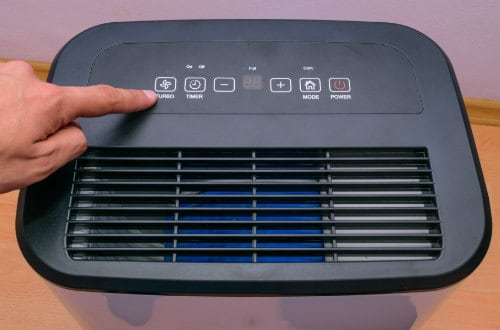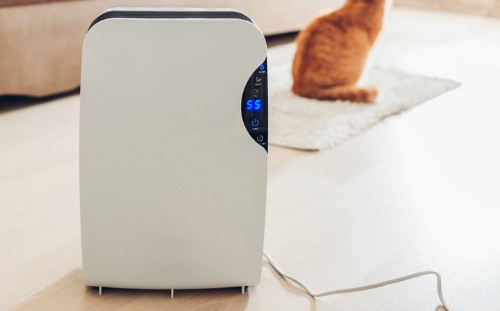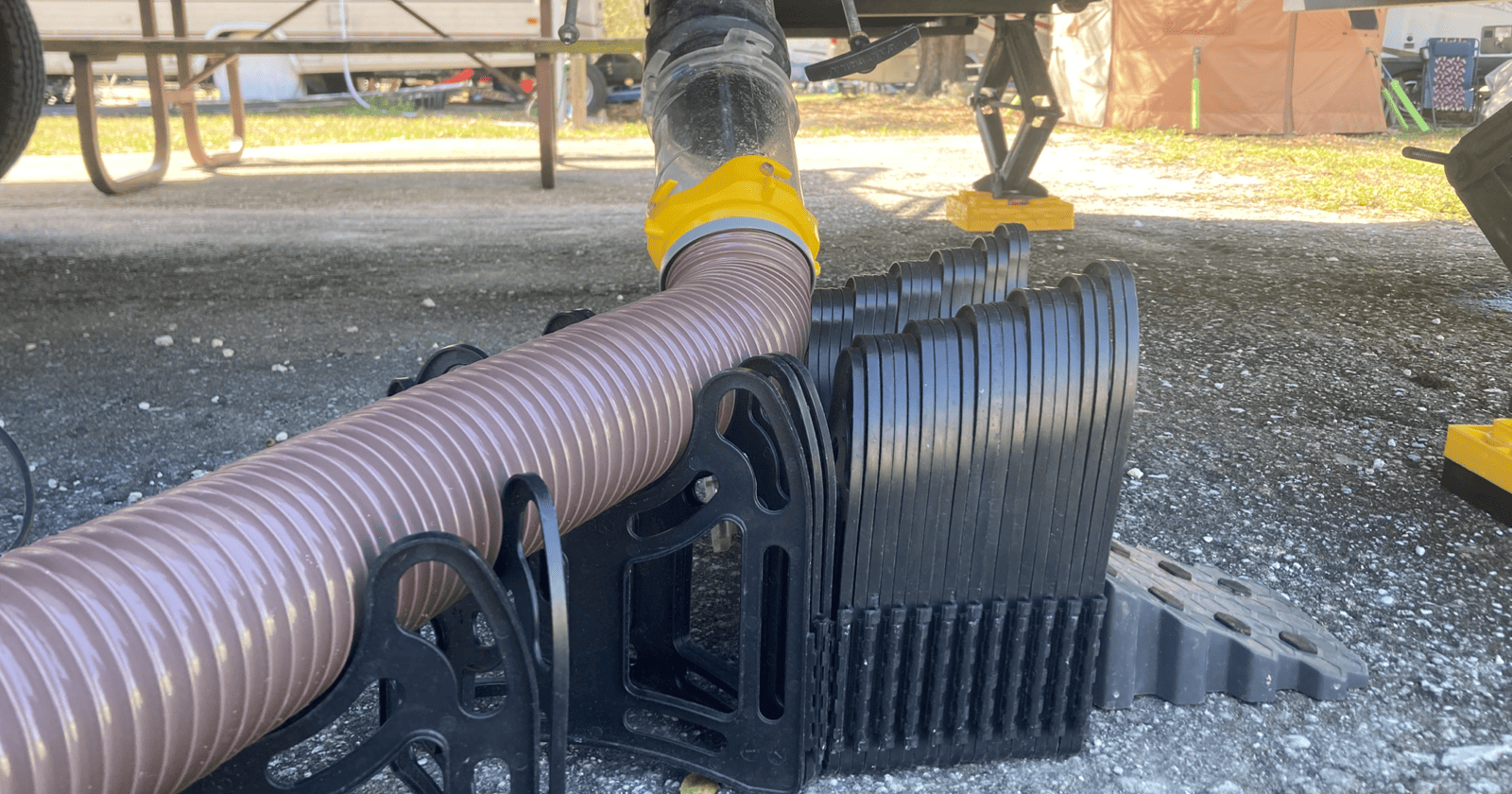Ever felt trapped inside your RV? A lot of the time, the heavy feeling you get inside the enclosed space is thanks to a high level of humidity. Because you eat, sleep, cook and shower inside such a small space, it’s only natural that water vapor accumulates in the air. When that happens, you need a way to freshen up the air and prevent molds. You’ll need an RV dehumidifier!
RV Dehumidifier in Action
When you think about RV amenities, what are the first things to come to mind? The water heater for your shower, the fully functional sink, and the horizontal mattress are just some of the features that make up a basic RV. One of the essential features that people forget to prioritize is dehumidifiers.
RV dehumidifiers work against the rising humidity which builds up inside your hybrid home. Water vapor from all of your indoor activities creates a stifling atmosphere and also condenses back into water when it cools. There are two types of dehumidifiers that can provide benefit to your RV: the desiccant dehumidifier and the refrigerant model.
Benefits of an RV Dehumidifier
Excessive condensation on your windows, damp floors and the heavy feeling of humidity are all things you should try to avoid while on the road in your RV. Aside from ruining your camping experience and leaving you sticky, high humidity can also lead to termite and pest problems.
Buying a good quality dehumidifier for your RV is a good investment. Before you get to experience all of these problems first hand, you should try and prevent them with a good dehumidifier. You can expect a lot of benefits from an RV dehumidifier for the price.
Controls Humidity Levels Inside the RV

The most obvious and also the most important benefit of RV dehumidifiers is humidity control. Humidity can either be absolute or relative. Absolute humidity is defined as the ratio between water vapor and dry air at a specific temperature. Most monitors present relative humidity, which is the ratio of absolute humidity to maximum humidity. Ideally, humidity inside RVs and other enclosed spaces like your house should be limited to 30-50%.
Having control over the humidity levels transforms your RV from a stifling environment to a comfortable space. In such a small and restricted atmosphere, it’s essential to control the different factors affecting your cozy trailer. It can spell the difference between suffering a more rustic camping experience and living well in your second home.
Without a dehumidifier, you’re stuck with inferior alternatives. You can crank open a window, but there’s no guarantee that a helpful breeze will come in and dispel the water vapors. You can also keep wiping down surfaces to remove the water condensation, but that’s just an ineffective stopgap measure. In contrast, all RV dehumidifiers in the market have the power to suck out moisture efficiently and quickly from enclosed spaces.
More Enjoyable Vacation
Your adventure to the countryside or to the mountains will suffer a serious hit if you are uncomfortable or even sick the entire time. High levels of humidity can make you more prone to the difficulty of breathing, especially if you have asthma, and to other skin problems.
Even if you are perfectly healthy, the high amount of water vapor in the air can feel oppressive and uncomfortable. You’d be spending most of your time outside of your RV just to get a fresh breeze and a lighter feeling, which is just counterintuitive.
Ventilation to solve these problems won’t always be an option. Even if you can open the windows or vents to let the wind in, it might not be enough. With a dehumidifier, you won’t have to cut your vacation time short just because of inconvenient and uncomfortable humidity levels. It’s a worthwhile investment because it allows you to enjoy the time and money you invested in going on a vacation in your RV or second home.
Prevents Condensation-Related Damage to Furnishings
Uncontrolled high humidity can negatively affect the different features and equipment inside your RV, especially if your RV is stored in one place for long periods. The problem is even more significant in camping locations or storage facilities with a combination of naturally high humidity and also hot temperature.
Water builds up in the air as water vapor. Over time, the water vapor condenses and gets deposited as water on your floor, windows, kitchen surfaces, furnishings, and even electronic equipment. This can lead to RV damage that will be difficult to repair or replace in the long run.
Without a dehumidifier, the best that you can do is to wipe moisture away from surfaces routinely. This is an incredibly inconvenient and taxing thing to do.
Prevents Mold and Pest Damage
High humidity levels are a good atmosphere for unsightly and unhealthy organisms. If you’ve been noticing mold and mildew growth in your RV, or if there’s been a weird infestation of termites and pest, you need to check the humidity levels.
At high humidity, the different nooks and crannies of your RV become more attractive spaces for these pests. For example, molds and surface fungi or mildew tend to grow in moist areas. If you’re concerned over any upholstery or fittings, then you need to focus on preventing mold and pest destruction.
Healthier Environment for the Skin and Body
The extremes of humidity can negatively affect the skin of everyone living in your RV in the same way too much sunlight or dry air can harm your health. In this case, too high or too low humidity can lead to adverse skin reactions.
High humidity can cause skin pores to open. The right balance can be helpful for dry skin in need of moisture. However, extreme humidity can make skin more susceptible to accumulating dirt particles, oil, and allergens in the environment over time. This process leads to inconvenient to more severe problems ranging from acne, eczema, rashes and allergic reactions.
There are also respiratory problems associated with high humidity, especially for people with a history of asthma or difficulty of breathing. The thickness of the air makes it difficult to breathe comfortably. Plus, dehumidifiers also dispel the atmosphere that breeds mold and mildew. This means that you and your family or friends are less exposed to disease-causing bacteria.
Low humidity, which is more common during winter months, can also cause problems. Specifically, people start complaining about dry skin, irritated nasal passages and throat, and itchy eyes once the humidity is too low. However, dry air and low humidity are rarely problems when camping out in your RV. High humidity is the more common problem encountered by campers.
Fresher and More Fragrant Air
When you live in such a small space, smell tends to stick around. In fact, you’re probably still smelling the dish you cooked last night. High humidity only adds to that problem, causing a characteristic musty smell.
Dehumidifiers can function a little bit like ventilation, in the sense that it changes the composition of the air inside the RV. As it extracts the moisture and water vapors from the environment, dehumidifiers shift the stagnant air with all its trapped odors. It can remove musty odors easily.
It can even help you deal with spilled liquids, sweaty clothes or smelly pets, which can all add to the musty odors in the environment.
Easy Control over Humidity Levels Inside the RV
Advancements in technology mean that using an RV dehumidifier is easier than ever. Anyone can get these easy-to-use devise up and running. There are so many different models to choose from. However, most models have an easy and convenient interface, ranging from touch panel controls to LED screens.
One of the most significant benefits to RV dehumidifiers is the convenience in setting up. Most machines come with timer settings, which would allow the machine to run at set hours per day, or at predetermined times. You can go out hiking in the woods for a while, and come back to a comfortable and fresh atmosphere inside your RV. Dehumidifiers can also be set to work all through the night or day.
Portable and Flexible Investment
RV dehumidifiers are like any other dehumidifier, only you should be on the lookout for versions designed specifically to be portable and energy efficient on the road. There are even dehumidifier models with built-in handles and wheels for greater mobility.
Mobility is excellent especially if you have a small dehumidifier which won’t be able to dispel all the water vapor inside your RV. You can quickly move the dehumidifier from one corner of your camper to another to focus its effects.
What makes RV dehumidifiers so practical is because they can also work perfectly in other enclosed spaces suffering from high humidity levels. This includes basements, large rooms at your home, and cellars. This is a fantastic benefit because you might not be parked at a high humidity environment all the time, so you might as well put your dehumidifier to good use elsewhere. Also, the portable design of these RV dehumidifiers means that you can easily store it once conditions change.
RV Dehumidifier Reviews
#1 – hOmeLabs 9-gallon Dehumidifier
BEST FOR: Very humid conditions in a larger RV, fifth wheel, or motorhome that has enough floor space to set the unit out of the way, yet in a central location to effectively treat the entire RV.
The hOmeLabs 9-gallon Dehumidifier is an excellent dehumidifier for controlling large amounts of moisture inside your RV.
This hOmeLabs unit controls humidity levels efficiently and has Energy Star certification. The dehumidifier is full-size, yet is sleek to look at and has a handle and wheels for easy portability. This unit can remove up to nine gallons of moisture from the air daily, so it’s a wonderful solution for those who camp in very humid locations.
Customers appreciate the automatic shutoff feature when the water tank is full, and the adjustable settings that allow it to operate 24-hours when in use with a drain hose. Customers also like the cleanable filter and how well this unit keeps mold and musty odors from growing inside their camper.
PROS:
- Removes large amounts of moisture/allergens daily
- Sleek and clean look
- Removeable filter
- Energy-efficient
- Fairly quiet
- User-friendly operation
- Easy to move
- Auto-shutoff function
CONS:
- Large unit not good for smaller campers
- Must check coils for frost
#2 – Eva-dry E-333 Renewable Mini Dehumidifier
BEST FOR: Tiny RVs teardrop campers, Class B motorhomes, and larger campers that have cabinets that need humidity control like inside clothes closets.
The improved Eva-dry E-333 Renewable Mini Dehumidifier is an environmentally-friendly moisture-control unit best for small campers and RVs or inside cabinets that have humidity issues.
This desiccant-style dehumidifier uses a water-absorbing non-toxic silica gel material to draw moisture from the air. It only works in small enclosed areas (up to 333 cubic feet) like inside a shut cupboard or bathroom to remove on average four to six ounces of water from the air. When the indicator beads say the dehumidifier is full, you swing out the built-in prongs and plug it into an outlet in an area that offers good air circulation until the unit renews itself.
Customers like the Eva-dry because it’s very affordable and doesn’t need power to work, which is helpful to conserve energy and it means it runs silently. Customers find it very effective to control moisture inside clothes closets or other small areas because the unit is so easy to tuck into tiny spaces.
PROS:
- Can renew the unit for up to ten years
- No cords or batteries to run
- Silent
- Very affordable mold and mildew control
- Very small
- Won’t leak or spill
CONS:
- Must renew it at least every month
- Only works up to 333 cubic feet
- Needs a power socket to renew the gel
- Not meant for fast moisture removal in heavy humidity areas
#3 – Ivation Powerful Mid-Size Thermo-Electric Dehumidifier
BEST FOR: RVers with mid-size campers or for those who would rather use a smaller unit they can move about their RV to treat critical areas. Great for small RVs that visit high-humidity areas.
The Ivation Powerful Mid-Size Thermo-Electric Dehumidifier is a compact, yet powerful unit that can control humidity levels in medium to large campers and motorhomes.
The water reservoir capacity is 64 ounces, and when the tank is full an indicator light turns on, and the device shuts off for safety. You can use the unit in a bedroom, bathroom or living area inside your recreational vehicle because it’s smaller than other dehumidifiers so it won’t get in the way.
Customers like that the Ivation keeps the noise down because it has no moving parts. The automatic humidistat allows you to set just the right level of comfort inside your camper and also keep mold, fungus, and musty smells at bay. Customers also like the lightweight design and ability to tuck it away inside a cabinet when not in use.
PROS:
- Indicator light when full
- Auto shut-off when full
- Compact design
- Quiet
- Works up to 2,200 square feet
CONS:
- No drain hose-must empty tank
- Smaller tank not made for extreme humidity conditions
#4 – Keystone KSTAD50B 50-Pint Energy Star Dehumidifier
BEST FOR: RVers on a budget who still need a larger dehumidifier to handle heavy moisture issues inside their camper.
The Keystone KSTAD50B 50-pint Energy Star Dehumidifier works quickly to reduce humidity levels inside your RV while drawing little power.
This full-size Keystone dehumidifier can reduce high moisture levels inside large campers and motorhomes by removing up to 50 pints of water a day. Feel more comfortable while you reduce the chance of mold and mildew growing inside your RV. The clear water level indicator makes it easy to see how much water is in the 1.3-gallon tank.
The unit has a 24-hour timer so you can set it to run at specific times and has caster wheels so moving it within your RV is easier. An automatic defrost feature will remove any frost that builds up on the evaporator coils so the unit maintains proper function.
Customers love the easy-to-use electronic controls of this dehumidifier, and the three settings (Normal, Turbo and Auto-Defrost) that clearly show on the bright LED display. People who use this model also like the removable dust filter that you can clean and replace when you receive a “clean filter” alert.
PROS:
- Runs quietly
- Quickly removes moisture
- Draws little power
- Handles large spaces
- Has a 24-hour timer
- Easy to move
- Auto-defrost function
- Bright LED display/electronic controls
- Easy to monitor water level
CONS:
- Hard to follow instructions
- Smaller water tank than others
- Needs adapter for continual drainage
#5 – Pro Breeze Portable Electric Dehumidifier
BEST
The Pro Breeze Portable Electric Dehumidifier is the ideal choice for humidity control in small campers or a single room inside your RV.
This dehumidifier’s compact size makes storing or using the unit in your RV a breeze. The small design is whisper-quiet and uses a thermoelectric cooling system instead of a compressor. A bright indicator light will flash to alert you that it’s time to empty the tank.
Customers enjoy how quiet it runs, and the 16-ounce capacity of the water tank so it can continue to operate while sleeping. The built-in automatic shutdown feature helps maintain safety. Customers also like the price and the ability to tuck the unit just about anywhere inside their camper without it getting in the way.
PROS:
- Ultra-quiet
- Removes dampness
- Compact size
- Lightweight
- Portable
- Affordable
- Auto-shutdown feature
CONS:
- Not for large spaces
- Need to empty small reservoir often
FAQs About RV Dehumidifiers
What’s the Difference Between a Desiccant and a Refrigerant RV Dehumidifier?
Desiccant dehumidifiers are best for closed spaces, and they are very effective in dealing with localized mold problems caused by water condensation. This type of dehumidifier works through the action of absorbent silica gel beads, which pull moisture from the air. Unlike refrigerant models, they do not always need electricity to operate.
However, they do sacrifice capacity in return. Desiccant humidifiers also have higher power consumption. Basically, the silica gel beads of desiccant dehumidifiers need to be dried out before it can start absorbing water vapor again. Because the silica gel beads release the water back into the air to dry out for reuse, you have to “recharge” the dehumidifier outdoors.
In comparison to refrigerant models, desiccant RV dehumidifiers are light and can work at temperatures as low as 33 degrees Fahrenheit. Warm air is also blown out of the unit through a relatively quiet process.
Refrigerant models have a bigger capacity; it can keep your entire RV free of molds and uncomfortable humidity. They work by chilling metal coils with a compressor and then fanning the air over the cold coils. The moisture is drawn from the passing air and collected in a containment basin, which you would then empty or drain.
Because of their size, refrigerant coil-based dehumidifiers tend to be heavier than desiccant models, with noisier mechanical parts. Still, the noise levels can be easy to ignore. However, they are cheaper in terms of relative unit cost and power consumption over time.
What Should I Look for When Choosing an RV Dehumidifier Model?

We all have our priorities when it comes to price and features. Here are some of the things you can look out for when comparing models:
- Timer – If you’re planning on being away from the RV for a night or for several hours at a time, you can set up your dehumidifier to function at a set time every day.
- Laundry setting – Dehumidifiers have the added benefit of helping dry clothes faster, as long as there’s a laundry setting. This works by operating the model non-stop.
- Size – In such a limited space, size is always a consideration. Thankfully, there are plenty of compact units with good capacity in the market.
- Humidistat – Monitoring the levels of humidity can help you better control your RV experience. The best models have an automatic switch-off when optimum levels are already reached.
- Adjustable louvers – With such a limited space to work with, it would be nice to have the ability to redirect the airflow of the vents.
- Portability and size – Are you planning to install the dehumidifier in your RV permanently, or will you be moving it back and forth from your RV? Dehumidifier units can weigh as much as 25 lbs., and you may need to carry it around with an appropriate handle and wheel system. Having a portable version can be less expensive and more convenient.
- Energy efficient – Dehumidifiers will be taking up space and valuable energy. Check out how energy efficient the model is, compared to how much water it can extract per day.
- Noise – More modern dehumidifiers are designed with more efficient and less noisy technology.
What Are the Factors Affecting Humidity Inside an RV?
Different factors affect the humidity inside an enclosed space such as an RV. First of all, interior humidity is affected by outside humidity. Looking at weather reports can give you an idea of general humidity levels, which change depending on the season as well as the geographical location. When the air is hot, especially during the day, water vapors get condensed. When outside temperatures drop as the night goes on, the water vapor starts to collect on windows and surfaces.
In terms of location, the local weather could have high humidity in general in places closer to the equator. Plus, RVs parked in storage spaces for long periods are also more likely to have moisture condensation because of the stillness of the air. However, excess humidity is almost a universal problem in all RVs, regardless of when and where.
Interior factors include the amount of activity you do inside the RV. Cooking food or taking a hot shower can all contribute to increased humidity and can saturate the air with water. Proper ventilation can help regulate the RV humidity levels, but it is rarely enough to address the problem.
Final Thoughts
Enjoying your summer vacation or living in your second home should be a story of great adventures and stylish comfort. High humidity levels put a serious cramp into your experience. For one thing, excessive humidity means a heavy, oppressive feeling that’s difficult to breathe in. That’s the opposite of a relaxing experience.
What the best RV dehumidifier for less humidity? We recommend the hOmeLabs 9-gallon Dehumidifier.
Thanks to uncontrollable factors like location, outside humidity, and stagnant air, your RV can suffer from water condensation on surfaces and furnishings. Aside from directly damaging your floor or equipment, water condensation also attracts mold, mildew, and pests. All of these things add up to health problems like skin allergies and asthma attacks.
RV dehumidifiers can solve this problem by sucking the moisture out of the air and drying out the atmosphere. It even clears out the musty odor inside RVs. Aside from preventing these problems, RV dehumidifiers also have the added benefit of being energy efficient, portable, and flexible.
If you want to relax at the end of a long day camping without worrying about high humidity or water vapor condensation, you can kick back and relax, thanks to RV dehumidifiers. It’s even more convenient if you have a dehumidifier with automated functions and round-the-clock timer settings.
What are your thoughts on getting an RV dehumidifier for your camper? Do you agree that it’s also an essential part of your RV? If you are convinced that dehumidifiers are necessary to your camping experience, I’d love to hear about what features and specifications you’d want to see in your ideal RV dehumidifier.




